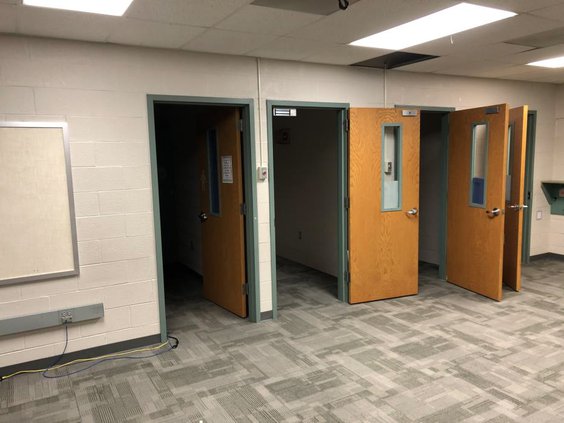Tiny “time-out” rooms at Eisenhower Elementary School will be replaced with larger rooms that better meet the needs of special education, according to Christie Gerdes, director of the Barton County Special Services Cooperative.
Last Monday the Great Bend USD 428 board of education approved a quote from Brentwood Builders for $11,231 to reconfigure space in the school.
The school board saw photos of four closet-sized rooms that will become two rooms. “We used to use them as time-out room,” Gerdes said. “We don’t need those kinds of rooms; we thought we did in 1998 (when the building was remodeled).”
While schools still have areas where students can calm down and have less sensory stimulation, isolation rooms by any name can be controversial. Gerdes did not address that topic, but indicated that the district’s well-trained staff have found better ways to de-escalate a student.
“The reason we can do this is because of the staff,” she said. “They do an awesome job.”
Personnel report
Great Bend and other Kansas school districts have had a hard time filling vacancies for school psychologists in recent years. During a report on personnel, also presented to the school board Monday, Assistant Superintendent John Popp said the seven positions yet to be filled for the fall semester still include one school psychologist and a special education teacher for hearing-impaired students. Gerdes said a teacher for hearing-paired students from outside the area will do contract work for the district.
The other positions yet to be hired are an instructional coach and two English teachers for Great Bend High School, an English teacher for Great Bend Middle School and a preschool teacher for Riley Elementary.
The Transition to Teaching program allows a teacher candidate to earn a Kansas teaching license while teaching full-time in an accredited Kansas school and taking approved coursework. This has allowed the district to cover some positions.
Still later in the meeting, the board approved the following personnel changes;
• Teacher resignations
- Trey Heitschmidt, teacher of special education at Riley Elementary
- Connie Claussen, Great Bend High School science teacher
• Teacher appointments
- Brandy Maneth, teacher of special education at Helping Hands Preschool (through the transition program)
- Joey “Allie” Wendleburg, second-grade teacher at Eisenhower Elementary
- Darwin Bouray, computer technology teacher at Great Bend Middle School
- Monte Doll, GBHS science teacher
- Kelly Hart, special education teacher at Riley and at private schools (through the transition program)
Special services co-op won’t serve outside students
Students as far away at Newton or even overseas will no longer be part of the Barton County Special Services cooperative, thanks to an agreement approved last Monday by the Great Bend USD 428 Board of Education.
The Cooperative Program Agreement approved by the Kansas State Board of Education outlines the terms of service for special education in the Great Bend, Ellinwood, Hoisington and Otis-Bison school districts. Great Bend is the largest district in the cooperative but all members must sign off on the agreement.
A potential problem arose because Otis-Bison has a partnership with SouthWinds Academy, an online alternative education program. SouthWinds can offer services anywhere in the world where students have access to internet. Co-op Director Christie Gerdes noted that Southwinds Academy has students in Newton, Florida and New Hampshire; she said that is “not what the co-op was intended for.”
The new contract specifies that co-op services are “available to the students whose primary attendance building is within the physical boundaries of one of the member districts. The responsibility for and the costs of special education services to students enrolled in a virtual school or alternative educational program who live outside of the boundaries of the member district are the obligation of the member district and not the cooperative ... (unless otherwise agreed).”
Assistant Superintendent John Popp said the new contract clarifies that students outside of the service area won’t receive service from the cooperative. Each of the cooperative members must sign the agreement. “Otis-Bison agreed; they don’t want to keep students not in their community,” he said.
“Those students who are not in our communities are not going to be served,” Gerdes agreed. The service is for “a student in a brick-and-mortar school we serve.”





